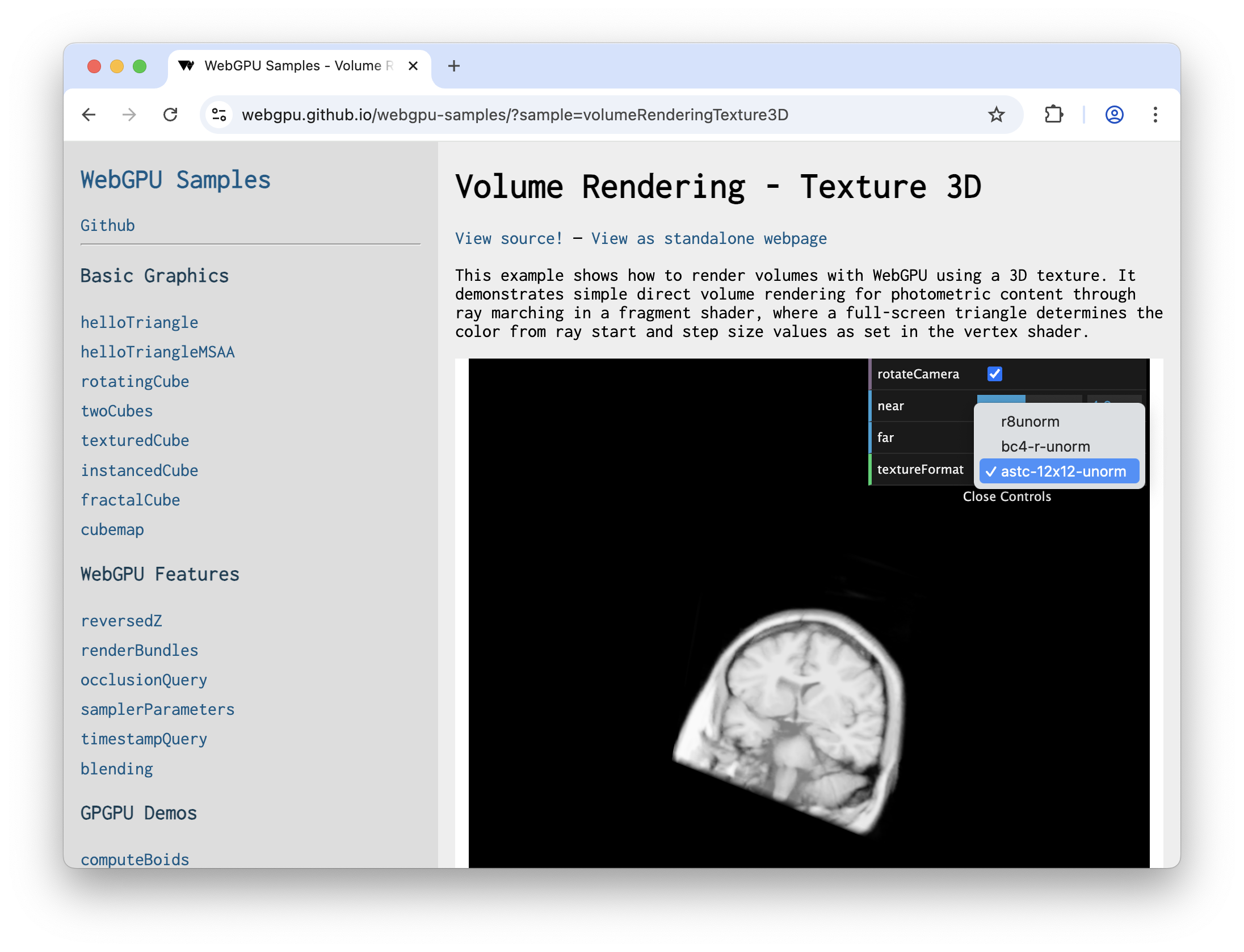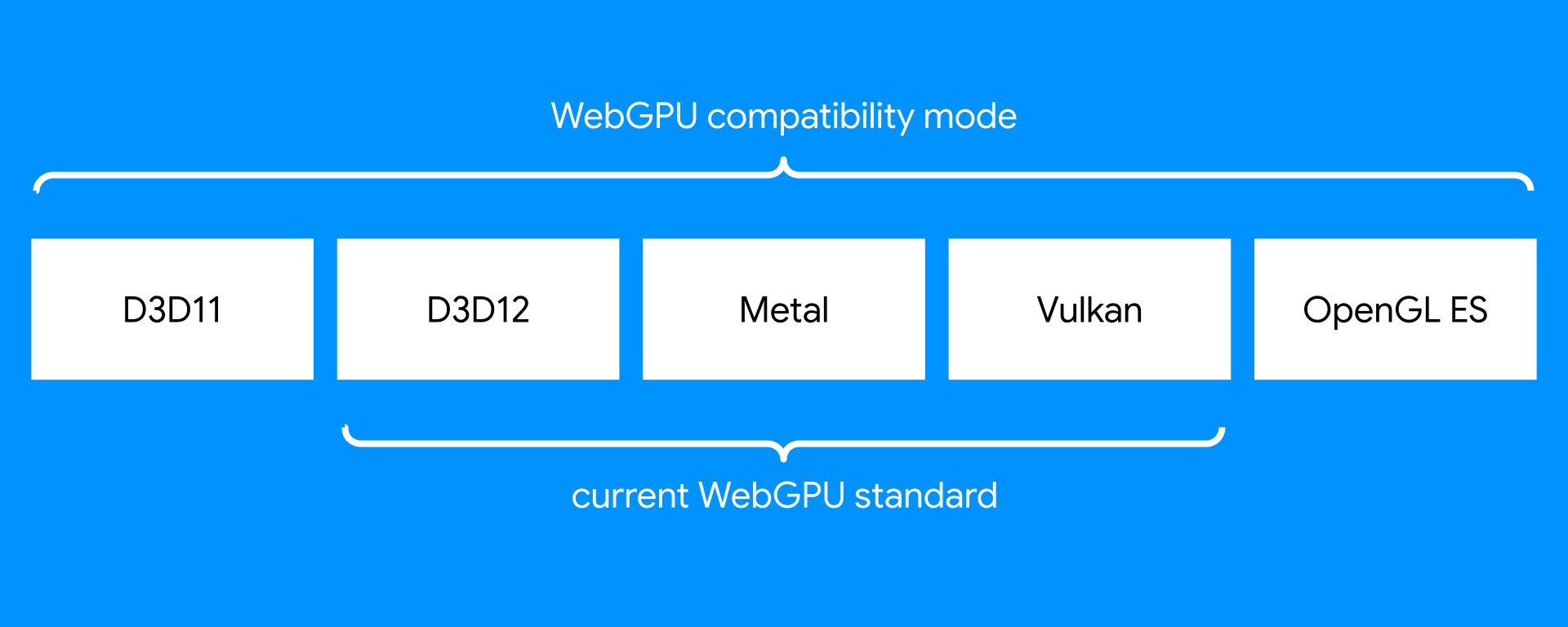Published: July 30, 2025
3D texture support for BC and ASTC compressed formats
The "texture-compression-bc-sliced-3d" and "texture-compression-astc-sliced-3d" WebGPU features add support for 3D textures using Block Compression (BC) and Adaptive Scalable Texture Compression (ASTC) formats. This lets you take advantage of the efficient compression capabilities of BC and ASTC formats for volumetric texture data, offering significant reductions in memory footprint and bandwidth requirements without substantial loss in visual quality. This is particularly valuable in fields such as scientific visualization, medical imaging, and advanced rendering techniques.
The following code snippet checks whether the adapter supports 3D textures with BC and ASTC compressed formats and requests a device with these features if they are available.
const adapter = await navigator.gpu.requestAdapter();
const requiredFeatures = [];
if (adapter?.features.has("texture-compression-bc-sliced-3d")) {
requiredFeatures.push(
"texture-compression-bc",
"texture-compression-bc-sliced-3d",
);
}
if (adapter?.features.has("texture-compression-astc-sliced-3d")) {
requiredFeatures.push(
"texture-compression-astc",
"texture-compression-astc-sliced-3d",
);
}
const device = await adapter?.requestDevice({ requiredFeatures });
// Later on...
if (device.features.has("texture-compression-astc-sliced-3d")) {
// Create a 3D texture using ASTC compression
} else if (device.features.has("texture-compression-bc-sliced-3d")) {
// Create a 3D texture using BC compression
} else {
// Fallback: Create an uncompressed 3D texture
}
Explore 3D brain scans by checking out the Volume Rendering - Texture 3D WebGPU sample and see the chromestatus entry.

New "core-features-and-limits" feature
A new "core-features-and-limits" feature is being introduced for the upcoming WebGPU compatibility mode. This feature indicates that the adapter or device supports core features and limits of the WebGPU spec. "core" WebGPU is the only version available at the moment, so all WebGPU implementations must include "core-features-and-limits" in their supported features.
In the future, when WebGPU compatibility mode ships, an adapter or a device may not have this feature to signify it is a compatibility mode adapter or device and not a core one. When enabled on a device, this lifts all compatibility mode restrictions (features and limits).
For a detailed explanation and usage in WebGPU compatibility mode, refer to the explainer and the following section. See issue 418025721.
Origin trial for WebGPU compatibility mode
WebGPU is a powerful API designed for modern graphics, aligning with technologies like Vulkan, Metal, and Direct3D 12. However, a significant number of devices still lack support for these newer APIs. For example, on Windows, 31% of Chrome users don't have Direct3D 11.1 or higher. On Android, 15% of Android users don't have Vulkan 1.1, including 10% who don't have Vulkan at all.
This creates a challenge for developers who want to maximize their application's reach. They're often forced to develop multiple implementations (for example, WebGPU and WebGL), accept a more limited audience with core WebGPU, or stick to WebGL, missing out on WebGPU's advanced features like GPU compute.

WebGPU compatibility mode offers a solution by providing an opt-in, slightly restricted version of the WebGPU API. This mode is designed to run older graphics APIs like OpenGL ES 3.1 and Direct3D11, significantly expanding your application's reach to devices that don't support modern, explicit graphics APIs required by core WebGPU.
Because compatibility mode is a subset of WebGPU, applications built with it are also valid WebGPU "core" applications. This means they will seamlessly run even on browsers that don't specifically support compatibility mode.
For many basic applications, enabling compatibility mode is as straightforward as passing featureLevel: "compatibility" when you call requestAdapter(). More complex applications might require minor adjustments to fit within the mode's restrictions. The Generate Mipmap WebGPU sample is a good example.
// Request a GPUAdapter in compatibility mode
const adapter = await navigator.gpu.requestAdapter({
featureLevel: "compatibility",
});
const hasCore = adapter?.features.has("core-features-and-limits");
const device = await adapter?.requestDevice({
requiredFeatures: (hasCore ? ["core-features-and-limits"] : []),
});
if (device?.features.has("core-features-and-limits")) {
// Compatibility mode restrictions will apply
}
Enable the feature
By default, WebGPU compatibility mode is not enabled in Chrome, but it can be experimented with in Chrome 139 by explicitly enabling the functionality. You can activate it locally by enabling the "Experimental Web Platform Features" flag at chrome://flags/#enable-experimental-web-platform-features.
To enable it for all visitors to your app, an origin trial is underway and set to end in Chrome 145 (Apr 21, 2026). To participate in the trial, refer to the Get started with origin trials post.
Dawn updates
A message argument is added to the WGPUQueueWorkDoneCallback function to be more consistent with other callback functions that take a status as well. See webgpu-headers PR.
When emdawnwebgpu is linked with -sSHARED_MEMORY, its webgpu.cpp file is also compiled with this flag. See Dawn CL 244075.
This covers only some of the key highlights. Check out the exhaustive list of commits.
What's New in WebGPU
A list of everything that has been covered in the What's New in WebGPU series.
Chrome 145
Chrome 144
- WGSL subgroup_id extension
- WGSL uniform_buffer_standard_layout extension
- WebGPU on Linux
- Faster writeBuffer and writeTexture
- Dawn updates
Chrome 143
Chrome 142
Chrome 141
- Tint IR completed
- Integer range analysis in WGSL compiler
- SPIR-V 1.4 update for Vulkan backend
- Dawn updates
Chrome 140
- Device requests consume adapter
- Shorthand for using texture where texture view is used
- WGSL textureSampleLevel supports 1D textures
- Deprecate bgra8unorm read-only storage texture usage
- Remove GPUAdapter isFallbackAdapter attribute
- Dawn updates
Chrome 139
- 3D texture support for BC and ASTC compressed formats
- New "core-features-and-limits" feature
- Origin trial for WebGPU compatibility mode
- Dawn updates
Chrome 138
- Shorthand for using buffer as a binding resource
- Size requirement changes for buffers mapped at creation
- Architecture report for recent GPUs
- Deprecate GPUAdapter isFallbackAdapter attribute
- Dawn updates
Chrome 137
- Use texture view for externalTexture binding
- Buffers copy without specifying offsets and size
- WGSL workgroupUniformLoad using pointer to atomic
- GPUAdapterInfo powerPreference attribute
- Remove GPURequestAdapterOptions compatibilityMode attribute
- Dawn updates
Chrome 136
- GPUAdapterInfo isFallbackAdapter attribute
- Shader compilation time improvements on D3D12
- Save and copy canvas images
- Lift compatibility mode restrictions
- Dawn updates
Chrome 135
- Allow creating pipeline layout with null bind group layout
- Allow viewports to extend past the render targets bounds
- Easier access to the experimental compatibility mode on Android
- Remove maxInterStageShaderComponents limit
- Dawn updates
Chrome 134
- Improve machine-learning workloads with subgroups
- Remove float filterable texture types support as blendable
- Dawn updates
Chrome 133
- Additional unorm8x4-bgra and 1-component vertex formats
- Allow unknown limits to be requested with undefined value
- WGSL alignment rules changes
- WGSL performance gains with discard
- Use VideoFrame displaySize for external textures
- Handle images with non-default orientations using copyExternalImageToTexture
- Improving developer experience
- Enable compatibility mode with featureLevel
- Experimental subgroup features cleanup
- Deprecate maxInterStageShaderComponents limit
- Dawn updates
Chrome 132
- Texture view usage
- 32-bit float textures blending
- GPUDevice adapterInfo attribute
- Configuring canvas context with invalid format throw JavaScript error
- Filtering sampler restrictions on textures
- Extended subgroups experimentation
- Improving developer experience
- Experimental support for 16-bit normalized texture formats
- Dawn updates
Chrome 131
- Clip distances in WGSL
- GPUCanvasContext getConfiguration()
- Point and line primitives must not have depth bias
- Inclusive scan built-in functions for subgroups
- Experimental support for multi-draw indirect
- Shader module compilation option strict math
- Remove GPUAdapter requestAdapterInfo()
- Dawn updates
Chrome 130
- Dual source blending
- Shader compilation time improvements on Metal
- Deprecation of GPUAdapter requestAdapterInfo()
- Dawn updates
Chrome 129
Chrome 128
- Experimenting with subgroups
- Deprecate setting depth bias for lines and points
- Hide uncaptured error DevTools warning if preventDefault
- WGSL interpolate sampling first and either
- Dawn updates
Chrome 127
- Experimental support for OpenGL ES on Android
- GPUAdapter info attribute
- WebAssembly interop improvements
- Improved command encoder errors
- Dawn updates
Chrome 126
- Increase maxTextureArrayLayers limit
- Buffer upload optimization for Vulkan backend
- Shader compilation time improvements
- Submitted command buffers must be unique
- Dawn updates
Chrome 125
Chrome 124
- Read-only and read-write storage textures
- Service workers and shared workers support
- New adapter information attributes
- Bug fixes
- Dawn updates
Chrome 123
- DP4a built-in functions support in WGSL
- Unrestricted pointer parameters in WGSL
- Syntax sugar for dereferencing composites in WGSL
- Separate read-only state for stencil and depth aspects
- Dawn updates
Chrome 122
- Expand reach with compatibility mode (feature in development)
- Increase maxVertexAttributes limit
- Dawn updates
Chrome 121
- Support WebGPU on Android
- Use DXC instead of FXC for shader compilation on Windows
- Timestamp queries in compute and render passes
- Default entry points to shader modules
- Support display-p3 as GPUExternalTexture color space
- Memory heaps info
- Dawn updates
Chrome 120
- Support for 16-bit floating-point values in WGSL
- Push the limits
- Changes to depth-stencil state
- Adapter information updates
- Timestamp queries quantization
- Spring-cleaning features
Chrome 119
- Filterable 32-bit float textures
- unorm10-10-10-2 vertex format
- rgb10a2uint texture format
- Dawn updates
Chrome 118
- HTMLImageElement and ImageData support in
copyExternalImageToTexture() - Experimental support for read-write and read-only storage texture
- Dawn updates
Chrome 117
- Unset vertex buffer
- Unset bind group
- Silence errors from async pipeline creation when device is lost
- SPIR-V shader module creation updates
- Improving developer experience
- Caching pipelines with automatically generated layout
- Dawn updates
Chrome 116
- WebCodecs integration
- Lost device returned by GPUAdapter
requestDevice() - Keep video playback smooth if
importExternalTexture()is called - Spec conformance
- Improving developer experience
- Dawn updates
Chrome 115
- Supported WGSL language extensions
- Experimental support for Direct3D 11
- Get discrete GPU by default on AC power
- Improving developer experience
- Dawn updates
Chrome 114
- Optimize JavaScript
- getCurrentTexture() on unconfigured canvas throws InvalidStateError
- WGSL updates
- Dawn updates

